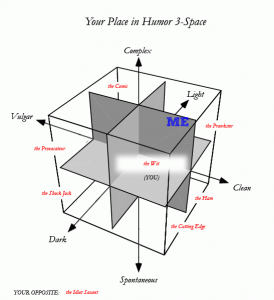That’s me, the bad data point … right there.
I generally don’t have much use at all for dating sites or online quizzes, so this is in no way a blanket endorsement … but I do recommend “The 3-Variable Funny Test” as a way to think about humor -in general and your own approach to it. Go take it and come back, because after the cut are spoilers.
This is me: “52% dark, 8% spontaneous, 16% vulgar”. Note that the way these percentiles work is that I am also “48% light, 92% complex, and 84% clean”. This puts me strongly in the “complex and clean” side of things, and just a bit more into “dark” than “light”.
I’m the Wit.
It’s true – I am totally witty as all hell. When I drift over to the light side, I’m the Prankster. But most of the time, I adore screwing around with words and expectations in a way that requires making intellectual leaps and is neither gross nor mean.
I think this is the best kind of humor, but I could be just a little biased. :)
I mean, anybody can repeat potty/body words over and over and get a giggle out of some folks. It just gets a yawn from me, and most folks who have emotionally graduated from midschool. There’s a reason that the Idiot Savant and the Shock Jock are my arch-nemeses – “hurr hurr you said boobs” is the laziest form of humor ever.
I might as well say “reticulated splines” until the sounds lose all meaning and are utterly funny-sounding and we giggle ourselves silly putting the emphasis on the wrong syllable.
I mean, really … reticulated splines. retiiiiiiculaaaaaaated spliiiiiiiines. RE-TIC-U-LATE. RE-TIC-U-LATE. RE-TIC-U-LATE. spli-nehs. suh-pliiinez. su-su-su-plines. What the heck kind of word is splines, anyway?
Why is humor like a burrito …
I sometimes say that I am “too smart to be funny”. It’s because I adore complexity. I adore humor that is complicated and layered, like a really good burrito.
It’s the kind of difference between:
- I like my coffee like I like my women: hot and black.
and - I like my coffee like I like my coffee: recursive.
and - I like my grapefruit juice the way I like my arch-enemies: bitter, easily down, and recently pulped.
Each one builds layers on top of the base joke, which is pretty much “hurr hurr boobs”, until you get something that’s funny but might take five minutes and a diagram to unpack.
Me?
I like my women like I like my humor: complex and multifaceted.
Where do you fit in the graph?


 Follow
Follow
I am also a Wit, but I’ll bet we both knew that already. A lot of what gets passed off as humor is at the expense of others, and whether it’s mean or not depends a lot on which direction it goes–advantage mocking disadvantage (all racist, misogynist, homophobic jokes), or disadvantage mocking advantage (the scathing indictments of Scrooge, for example). The former supports and normalizes inequality, while the latter serves to criticize and subvert the underlying structures of inequality. I prefer humor that doesn’t come at anyone’s expense, but if that’s the order of the day, give me subversive humor any day. I don’t find it at all funny to kick someone already down.
Unrelated to the topic at hand, poorly designed survey was poorly designed. “Really funny/Pretty funny/Only okay funny/Ashamed?” One of these things is not like a logical inclusion on the established spectrum.
There were some things on there that were so not-funny and at-the-expense-of-others that I was … wishing I weren’t reading them. ‘Ashamed’ isn’t quite the right word, other than ashamed at being part of the same species as folks who do think it’s ‘really funny’.
Wit here, too. I had a slightly higher spontaneous score and a slightly lower vulgar score.
We should start a club. ;)
Prankster, here. :D Love the ‘I like my women like I like my humor: complex and multifaceted’ line. Practically cheered in my head. Are you a Spider Robinson fan?
YAY!
I half enjoy and half can’t stand Spider. Never understood why until I read Variable Star, in which he writes the book Heinlein left notes for. My ‘can’t stand’ reasons for both of them are the same: deux ex sudden insight. I don’t mind twist endings, as long as there’s some front loading of clues. The lead character chortling on for a while about the ‘obvious’ solution before deigning to explain it gets a bit tedious. Other’n that, some good stuff.